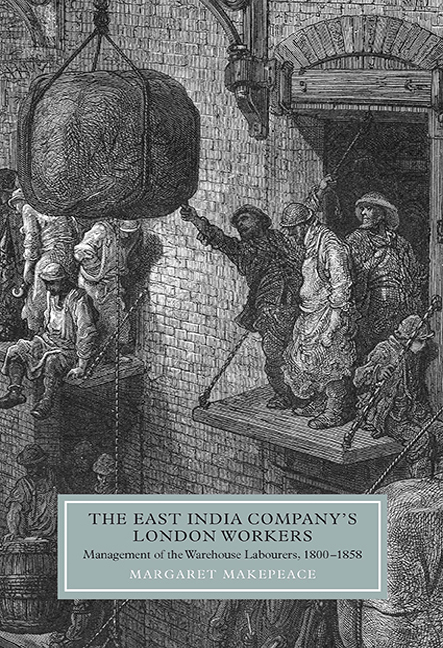Book contents
- Frontmatter
- Contents
- Figures and tables
- Dedication
- Acknowledgements
- Abbreviations
- 1 Introduction
- 2 The East India Company Warehouses
- 3 The Warehouse Labourers
- 4 Management Strategies: Incentives, Rewards and Benevolence
- 5 Management Strategies: Systems of Internal Control
- 6 The Royal East India Volunteers: The ‘Union of Civil and Military Dependence’
- 7 The Relationship Between the East India Company and its London Warehouse Labourers
- 8 The Warehouse Closures
- 9 Management of the Warehouse Labourers and Pensioners 1838–1858
- Conclusion: ‘Good Masters to the Lower Class of Their Dependents’
- Bibliography
- Index
8 - The Warehouse Closures
Published online by Cambridge University Press: 13 April 2017
- Frontmatter
- Contents
- Figures and tables
- Dedication
- Acknowledgements
- Abbreviations
- 1 Introduction
- 2 The East India Company Warehouses
- 3 The Warehouse Labourers
- 4 Management Strategies: Incentives, Rewards and Benevolence
- 5 Management Strategies: Systems of Internal Control
- 6 The Royal East India Volunteers: The ‘Union of Civil and Military Dependence’
- 7 The Relationship Between the East India Company and its London Warehouse Labourers
- 8 The Warehouse Closures
- 9 Management of the Warehouse Labourers and Pensioners 1838–1858
- Conclusion: ‘Good Masters to the Lower Class of Their Dependents’
- Bibliography
- Index
Summary
FAREWELL ON THE BREAKING UP OF THE EAST INDIA COMPANY's GREAT ESTABLISHMENT1
1 Stay gentle Muse, and deign to smile,
A little with us dwell,
Let us invoke thy aid awhile,
To make our last – FAREWELL.
2 Reform, search History's page and see,
What in this age befell,
When to this great Monopoly
The country bids – FAREWELL.
3 The bill dictates by sweeping lines,
And LEADENHALL MONARCHS tell
Their trade with ORIENTAL climes,
Must henceforth bid – FAREWELL.
4 For when the great concern's broke up,
With some it may be well,
While others taste the bitter cup
Of life, and say – FAREWELL.
5 Some quit the soil which gave them birth,
To cross the ATLANTIC swell,
And fly, perhaps, from bad to worse,
When they pronounce – FAREWELL.
6 ‘Tis hard to leave our native strand,
Or cottage in the dell,
To seek for bread in distant land,
And say to friends – FAREWELL.
7 In age to emigrate is vain,
Do not your birthright sell,
But trust in GOD, and you will gain
Your bread, nor say – FAREWELL.
8 But when Death's fatal arm shall strike
The blow which sounds your knell,
May we soar up to regions bright,
No more to say – FAREWELL.
The Charter Act of 1813 took away the East India Company's monopoly of trade to India but maintained its exclusive privilege of trade with China. Twenty years later, the Charter Act of 1833 put an end to all the Company's commercial activities and forced the closure of almost all the London warehouses. The directors had been prepared for change but the scope of the legislation of 1833 took them by surprise. As they commented in 1834:
the change which has taken place exceeds that upon which the most prudent calculator could have justly reckoned. Not only has the Company's exclusive privilege of trade to China been abrogated (it was generally expected that such would be the case), but the Company's trade is wholly to cease. That could scarcely have been expected.
The legal obligation to cease all commercial activity meant that the Company directors were faced with the need to formulate a systematic rolling programme of mass redundancy at East India House and the warehouses on what must surely have been an unprecedented scale in the 1830s.
- Type
- Chapter
- Information
- The East India Company's London WorkersManagement of the Warehouse Labourers, 1800–1858, pp. 156 - 182Publisher: Boydell & BrewerPrint publication year: 2010

